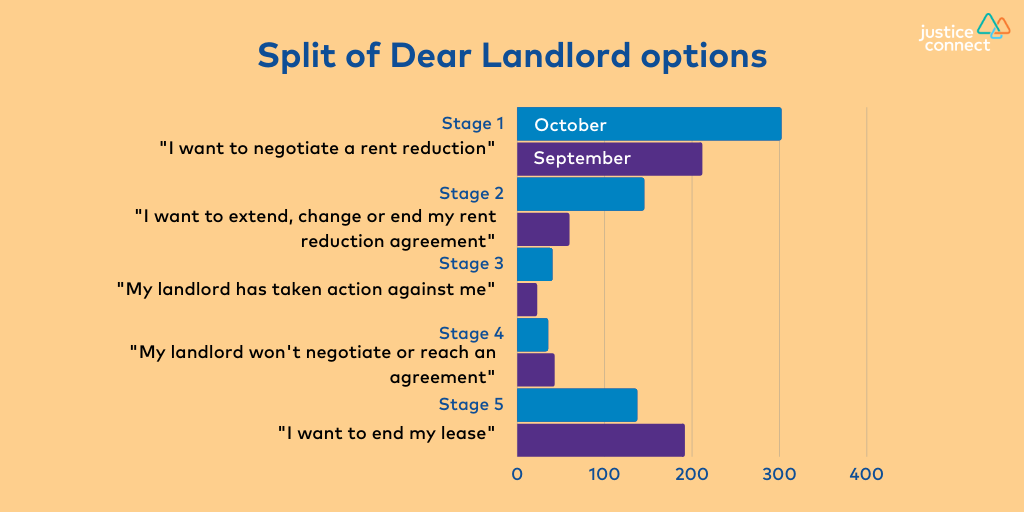Insights from our October COVID-19 response
10 Dec 2020
Throughout the COVID-19 pandemic, we’ve continued to run all our existing services — as well as launch new interventions in response to the rising need for legal help in the community. We design our responses based on the evidence we see in the qualitative and quantitative data we collect.
This update will be focusing on our work responding to individual legal matters in October. You can review findings from previous months by reading our Fair Matters blog posts.
Our data on demand for legal help in October
While traffic to our website remained above average, we saw a continued levelling out of the spike of traffic we received as Victoria re-entered lockdown. Traffic to our resource on Emergency Powers in Victoria dropped by 39% compared to September, which accounted for 80% of our total traffic reduction compared to September.

Even with this reduction in traffic, our resource on Emergency Powers in Victoria remained popular due to being shared across Facebook groups, as we discussed in our August update.
Our highest acquisition channel in October remained organic search at 53.7% of total traffic. Our top search terms (filtering for “Justice Connect”, searches for specific services such as “Not-for-profit Law”, and searches for “Ruth McColl” due to the events in the news) were:
-
- Dear Landlord
- Sequestration Order
- When Does State of Disaster End?
- State of Disaster Victoria.
Our top self-help resources in October

Other popular resources included Joint debts and assets in bankruptcy, responding to debt collection during COVID-19, accessing courts during COVID-19, claiming unpaid wages over $20,000 and bankruptcy and the family home. Other non-COVID-19 related resources also made our top-10 resources in October, namely our resources on sexual harassment.
People were asking about financial issues through Justice Connect Answers
Our resources were not the only area where demand for legal information on financial matters remained high. We also saw a large number of questions related to financial issues posted to Justice Connect Answers. Justice Connect Answers is our online legal clinic that allows people to ask simple legal questions and have a lawyer provide discrete advice for free.

Of the 53 questions asked on Justice Connect Answers in August, 26% were related to financial issues, 13% to housing and homelessness, 11% to personal rights and safety and 11% to work matters. These were the top categories people self-selected for their legal problems, other than the category “other” (25%).
Smart referral pathways increased traffic to our Dear Landlord tool
Thanks to ongoing discussions with Consumer Affairs Victoria, our Dear Landlord tool was listed as a resource for people seeking rent reductions from their landlords on the Consumer Affairs Victoria website and the Victorian Government’s coronavirus website.

Following the plateau we mentioned in our September blog post, page views to our Dear Landlord tool continued to rise again in October. This was in part due to improved referral pathways to our tool as sector and government websites began to link to Dear Landlord. In October, 54.3% of traffic to Dear Landlord came through a referral path from the Victorian Government’s coronavirus website directly to Dear Landlord. Interestingly, when looking at our paid advertising for Dear Landlord, the highest conversion (for paid ads that reached over 100 people) came through Instagram Stories at 21.6%. We’ll continue to monitor the most effective media for reaching our audience.

In October, we saw a shift in the most accessed stages for Dear Landlord users. The most accessed stage was “I want to negotiate with my landlord for a rent reduction” (stage 1), followed by “I want to extend, change or end my rent reduction agreement or rent reduction order” (stage 2). Previously, the second most popular option was “I want to end my lease”, meaning stage 2 has overtaken it to become our second most accessed stage. This corresponded with our prediction from our September insights that people who had already negotiated a rent reduction were likely to need to extend their agreements due to COVID-19 laws being extended by six months to March 2021.
Anecdotally, we have seen that some landlords have been seeking to evict tenants who have an expired rent reduction agreement as opposed to negotiating a new rent reduction agreement while tenants are still finding their feet post-lockdown in Victoria.
We saw fewer tenancy-related enquiries, but more were related to eviction
In October, our Homeless Law team saw a 19% drop in overall enquiries compared to September. Similarly, tenancy enquiries were 18% lower in October than in September. Of the enquiries we received in October, we had an increase in the proportion of evictions for rent arrears, with rent arrears evictions making up 17% of all enquiries and 28% of total tenancy issues.
To help prevent eviction related enquiries from increasing, our current focus is on transition planning for the end of the current COVID tenancy protections into the new Residential Tenancies Amendment Act in March/April 2021. We see a need for effective transitional protections for tenants, including access to legal and financial supports, to prevent homelessness and sustain tenancies during the COVID recovery period.
People clicked through to single-issue resources, rather than combined hubs
In previous blog posts, we explored the connection between people having issues related to employment, financial problems and housing and tenancy. We identified that these issues can aggravate, meaning that an employment issue can have flow-on effects for someone’s finances, and eventually their housing security. Based on this insight, in October we split tested whether people would respond better to ads promoting resource hubs related to tenancy, employment and financial issues, or whether it was better to target people with one piece of information — and if so what.
Employment was the winner at almost a third of the cost per page view. Interestingly, when directing people to a combined resource hub, we received more engagement on the post, while fewer people clicked through to find out more information about how we could help.
Based on these findings, we ran the winning employment ad, targeted towards people who were interested in Centrelink, employment agencies, jobs and other employment-related activities.
We will continue to message test our hub resources using different combinations of natural language.
Looking forward
We’re continuing to take a preventative approach to managing financial and housing-related stress during the COVID-19 crisis. While enquiries related to bankruptcy remain low — as we highlighted in our September insights — we’re continuing to push legal information out to help people prepare for when current extensions on bankruptcy and debt limits come to an end from the 1st of January next year.
Similarly, we are continuing to advocate across areas where we see high levels of need, such as in housing and tenancy. We know that one of the ways to prevent homelessness during the COVID-19 recovery period is to build more homes. We used key evidence and data from our Dear Landlord self-help tool — along with frontline service delivery — to advocate with government for the need for increased social housing supply. Collaborative sector advocacy resulted in the recent Vic govt announcement of $5.3 billion investment in social housing build, including 12,000 new social housing homes.

